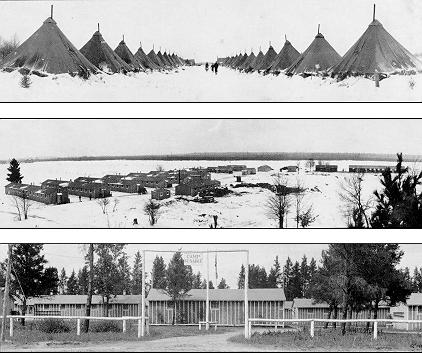The Civilian Conservation Corps (CCC) was a public work relief program that operated from 1933 to 1942 in the United States for unemployed, unmarried men from relief families, ages 17–28. James McEntee was the head of the agency. A part of the New Deal of President Franklin D. Roosevelt, it provided unskilled manual labor jobs related to the conservation and development of natural resources in rural lands owned by federal, state and local governments. The CCC was designed to provide employment for young men in relief families who had difficulty finding jobs during the Great Depression while at the same time implementing a general natural resource conservation program in every state and territory. Maximum enrollment at any one time was 300,000; in nine years 2.5 million young men participated in the CCC, which provided them with shelter, clothing, and food, together with a small wage of $30 a month ($25 of which had to be sent home to their families).[1]
The American public made the CCC the most popular of all the New Deal programs.[2] Principal benefits of an individual's enrollment in the CCC included improved physical condition, heightened morale, and increased employability. Of their pay of $30 a month, $25 went to their parents.[3] Implicitly, the CCC also led to a greater public awareness and appreciation of the outdoors and the nation's natural resources; and the continued need for a carefully planned, comprehensive national program for the protection and development of natural resources.[4]
During the time of the CCC, volunteers planted nearly 3 billion trees to help reforest America, constructed more than 800 parks nationwide and upgraded most state parks, updated forest fire fighting methods, and built a network of service buildings and public roadways in remote areas.[5]
The CCC operated separate programs for veterans and Native Americans.
Despite its popular support, the CCC was never a permanent agency. It depended on emergency and temporary Congressional legislation for its existence. By 1942, with the war industries booming and the draft in operation, need declined and Congress voted to close the program.[7]


No comments:
Post a Comment